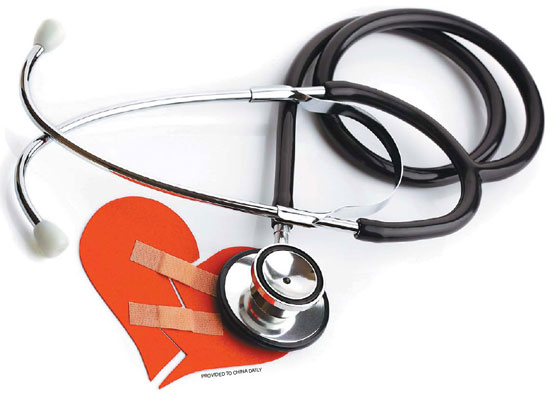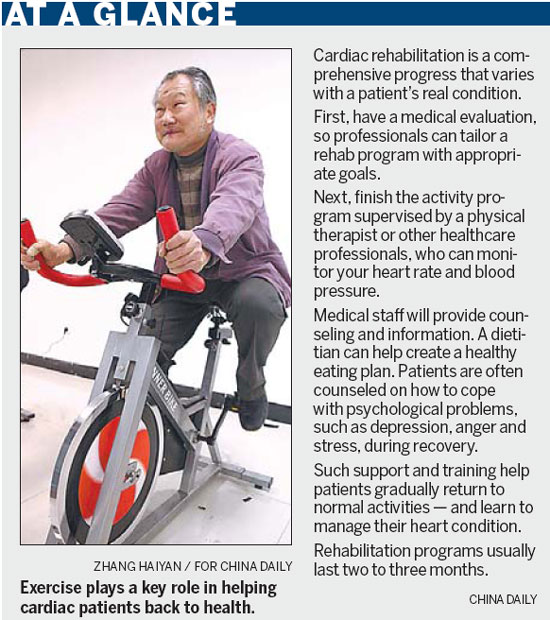
Don't just lie down after heart surgery, cardiologists say. They tell Wang Hongyi in Shanghai that moderate exercise will speed recovery.
Shanghai businessman Zheng Yongchao looks fit and refreshed upon returning from his trip to Sanya on tropical Hainan Island. Few would suspect that the 45-year-old had suffered a serious heart attack and had a surgery just three months ago. What made him recover so quickly, Zheng says, was the two-month-long cardiac rehabilitation program he took up after surgery. Under professional supervision, such rehab programs can help patients like Zheng recover from heart surgery and even procedures, such as stenting and angioplasty, says Wang Taoli, a cardiac rehabilitation doctor with Shanghai Delta Hospital and Clinics.
Under this comprehensive approach, doctors provide education and counseling services and help heart patients establish physical training plans, improve their physical fitness and lower the risk of future heart problems, Wang explains.
"Many patients think they should stay at home and avoid any physical activities after the surgery. They're totally wrong," Wang says. "Actually exercise is the core part of the whole rehabilitation."
During the two-month program, Zheng had performed moderate exercise, such as working out on a treadmill and riding a stationary bicycle.
"Above all, the program has helped me establish a healthy lifestyle. Doctors told me what to eat and what not to eat," Zheng says.
Now the businessman has resumed his work routine and enjoys traveling during his spare time.
"I feel much better, physically and spiritually," he says.
According to the 2011 China Cardiac Disease Report, the death rate for patients who have cardiac rehabilitation therapy is 20 percent lower than for those who don't. The admission rate for a second hospital trip can be reduced by 30 percent.
"Cardiac rehabilitation is an important part for heart disease and stroke patients' recovery in Western countries, but it's much underutilized in China," says Hu Dayi, one of the country's top cardio physicians.
China recorded more than 330,000 heart-intervention surgeries in 2011, according to the report. But Hu says that patients' awareness of cardiac rehabilitation is very low.
"When a car breaks down, it needs repair. But it's more important to maintain it after the repair. The same for a heart problem. People only know they have to have surgery on their heart, but ignore the importance of heart rehabilitation," he says.
Yan Jing, president of Zhejiang Hospital in Hangzhou, says his hospital set up one of the country's first cardiac rehabilitation centers in 1999. But the daily visit is about 10.
Though 20 percent of cardiac patients receive rehabilitation now, compared to 4 percent in 2004, such programs suffer from limited medical resources and personnel, as well as poor education and publicity, according to Liu Changping, a medical management expert in Shanghai.
"In China, it's rare to see medical institutions and professionals for cardiac rehabilitation," says Liu, who is also managing director of Shanghai Delta Hospital and Clinics.
Liu's hospital is a Sino-US joint venture, which is known for its cardiac rehabilitation programs.
China now has 40,000 rehabilitation professionals, which is a tenth of the number needed to properly serve the country's 1.3 billion population, according to experts.
Despite being a crucial part of prevention for chronic diseases, cardiac rehab is not covered by medical insurance, which makes it a financial burden for many patients, Liu says.
Heart disease and strokes have emerged as the top killers worldwide. In China, about 230 million people suffer from cardiac disease, which means two in every 10 Chinese are heart patients.
The more people know about the benefits of a rehab program, the more likely they are to try it, says Sidney Smith, president of the World Heart Federation.
Last June, a program to help train more rehabilitation professionals was launched in Beijing. Jointly supported by the American College of Sports Medicine and Focal Point in China, the program will encourage patients to increase physical fitness for better recovery after surgery.
Contact the writer at [email protected].

(China Daily 02/06/2013 page19)
